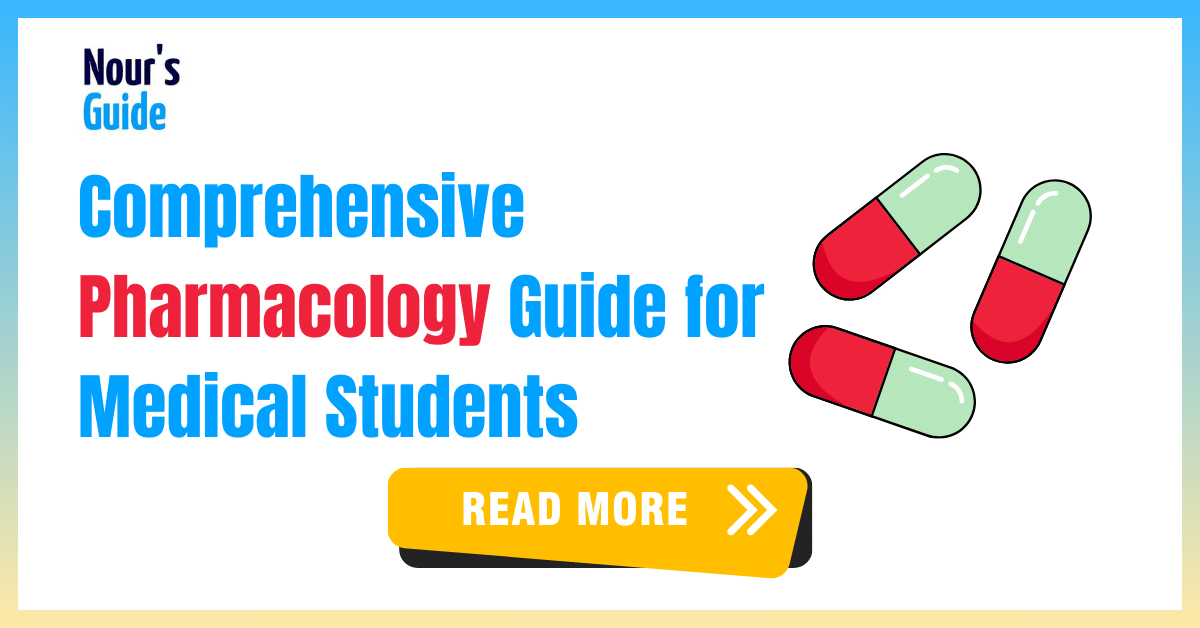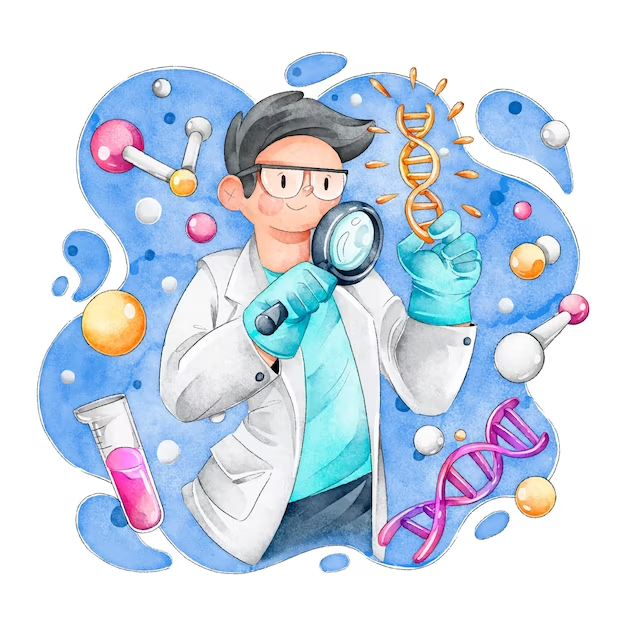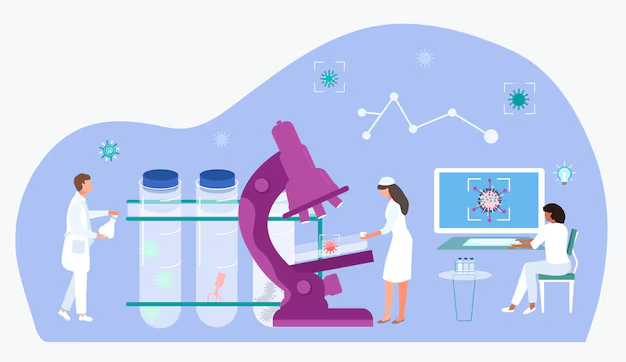Master Pharmacology Study Guide for Medical Students14 min read
Introduction
Pharmacology is a crucial subject in medical education, providing students with the knowledge and understanding of how drugs interact with the human body. However, many medical students face challenges when it comes to studying pharmacology effectively. In this blog post, we will explore the importance of pharmacology in medical education and discuss the common challenges faced by students in learning this subject.
Table of Contents
Pharmacology Study Resources:

Pharmacology Textbooks:
Pharmacology BRS pdf
The Pharmacology BRS (Board Review Series)
It provides a concise overview of key pharmacology concepts and principles.
The Pharmacology BRS pdf is a popular resource among medical students, pharmacy students, and healthcare professionals.
It is used for preparing for exams or looking to reinforce their understanding of pharmacological topics.
The Pharmacology BRS pdf covers a wide range of drug classes.
This includes their mechanisms of action, therapeutic uses, adverse effects, and clinical considerations.
It is structured in a user-friendly format with helpful illustrations, tables, and practice questions.
This facilitates active learning and retention of the material.
Many students and professionals consider the Pharmacology BRS pdf an essential tool.
It is used for efficient and effective pharmacology review and exam preparation.
Rang and Dale pharmacology 8th edition pdf
Rang and Dale’s Pharmacology 8th edition pdf is a renowned and widely-used textbook in the field of pharmacology.
Written by renowned pharmacology experts, this comprehensive resource provides in-depth coverage of the fundamental principles of pharmacology as well as the pharmacodynamics and pharmacokinetics of major drug classes.
The 8th edition of this textbook has been thoroughly updated to include the latest developments and research in pharmacology. It features expanded sections on topics such as drug receptors, drug-receptor interactions, and signal transduction pathways.
The clear and easy-to-understand writing style, coupled with an abundance of illustrations, tables, and case studies, make Rang and Dale’s Pharmacology 8th edition pdf an invaluable tool for medical students, pharmacy students, and healthcare professionals seeking a authoritative reference on pharmacological concepts and drug therapy.
Many consider this textbook to be an essential addition to any pharmacology library.
crash course pharmacology pdf
The Crash Course Pharmacology PDF is a concise and highly-accessible study guide for medical and pharmacy students looking to quickly review and reinforce their understanding of key pharmacological principles. Designed in an easy-to-digest format, this resource provides a structured overview of essential pharmacology topics, including drug classifications, mechanisms of action, clinical applications, and adverse effects.
clinical pharmacology made ridiculously simple pdf
168 page Clinical Pharmacology Made Ridiculously Simple by James Olson is an extraordinary book that provides incredible and deep information about clinical pharmacology. It is a valuable resource that can be accessed anytime on your laptop or cell phone, without taking up physical space. The book’s great arrangement in word and layout ensures an interesting reading experience.

Lippincott pharmacology 6th edition pdf
The book now includes new chapters on various topics such as Drugs of Abuse, Drugs for Obesity, Antihistamines, Drugs for Urologic Disorders, Drugs for Hematopoietic Disorders, Drugs for Dermatological Disorders, and Drugs for Bone Disorders.
Additionally, the book has over 380 study questions and nearly 600 annotated, full-color illustrations that visually explain complex processes. The outline format of the book makes it ideal for concise review and foundational learning.
Over 380 study questions!
Nearly 600 annotated, full color illustrations visually explain complex processes!
Outline format ideal for concise review and foundational learning
katzung pharmacology
Basic & Clinical Pharmacology, Fourteenth Edition covers the important concepts of pharmacology and its application to clinical practice. The book includes sections on the clinical choice and use of drugs, monitoring their effects, and case studies. It is presented in full color with over three hundred illustrations and features numerous summary tables and diagrams.
pharmacology summary pdf
Pharmacological Classification of drugs pdf
https://www.isbe.net/CTEDocuments/HST-L690038.pdf
Pharmacology flashcards
Pharmacology Flashcards are a powerful study tool for medical students looking to master the complex field of pharmacology. These cards cover a wide range of topics, from drug classifications and mechanisms of action to side effects, contraindications, and dosing information.
The key benefit of using flashcards is that they break down large amounts of dense information into easily digestible, bite-sized chunks. This makes it easier to retain and recall critical pharmacological concepts.
You Can read our blog on Flashcards and get access to a ton of them. and you can use this external resource on atitesting
When using Pharmacology Flashcards, it’s recommended to go through them regularly in focused study sessions, testing your knowledge by covering the answers and seeing how much you can recall. You can also try grouping cards by drug class or by a specific disease state to identify connections and patterns. Additionally, creating your own custom flashcards can be an effective way to synthesize information and reinforce your understanding. Used consistently, Pharmacology Flashcards can be an invaluable resource for medical students to build a strong foundation in this essential medical discipline.
Top Pharmacology Online Courses:
1. Sketchy Pharma
Sketchy Pharmacology is one of the best overall resources for medical students studying for the USMLE Step 1 exam. Sketchy uses great mnemonic devices and visuals to help you remember different drugs and their mechanisms of action, side effects, and clinical applications. The Sketchy method is renowned for its ability to make complex pharmacological concepts more memorable and easier to recall.
2. Ninja Nerd
Ninja Nerd is also known as the best YouTube channel for medical students they cover so many subjects pharmacology included.
Here is an example of Dr. Zach on Antibiotics
3. Dr Matt & Dr Mike
These doctors are both explaining the most complex subjects in a very good way I think there Pharmacology playlist will be a great resource for studying pharmacology
For More In-Depth Resources Check Out Our STEP 1 Resources Guide
Effective Strategies for Studying Pharmacology
Studying pharmacology requires a systematic approach to build a solid knowledge base and develop problem-solving skills. Let’s explore some effective strategies for mastering this subject:
pharmacology abbreviations & pharmacology mnemonics

Building a Solid Pharmacology Knowledge Base
To develop a strong foundation in pharmacology, medical students should focus on understanding drug names and their properties. This includes learning the generic and brand names of commonly prescribed medications, as well as their indications, contraindications, and side effects. Additionally, memorizing key drug classes and their representative examples can help students recognize patterns and make connections between drugs.
You can see our blog on high-yield topics for the USMLE Step 1 exam.
High Yield Topics for Antibiotics Pharmacology
Antibiotic Classifications:
Understand the different classes of antibiotics and their mechanisms of action.
Examples include cell wall synthesis inhibitors (e.g. beta-lactams), protein synthesis inhibitors (e.g. aminoglycosides, macrolides), and DNA/RNA synthesis inhibitors.
Spectrum of Activity:
Know the distinction between gram-positive, gram-negative, aerobic, and anaerobic coverage for different antibiotic classes.
Understand how this guides appropriate antibiotic selection.
Beta-Lactam Antibiotics:
Learn the pharmacology of penicillins and cephalosporins, including examples, mechanisms, and resistance patterns.
Antibiotic Resistance:
Understand the key mechanisms of antibiotic resistance, such as enzymatic inactivation, target site modification, and decreased permeability.
Be familiar with strategies to combat resistance, including combination therapy and antibiotic stewardship.
Impact on the Microbiome:
Recognize the potential for antibiotic-induced dysbiosis and increased risk of Clostridioides difficile infection.
Know the role of probiotics and prebiotics in restoring gut flora.
Pharmacokinetics and Pharmacodynamics:
Understand the principles of absorption, distribution, metabolism, and excretion for different antibiotics.
Distinguish between time-dependent and concentration-dependent killing.
Adverse Effects and Interactions:
Be aware of common side effects and allergic reactions associated with antibiotic use.
Identify potential drug-drug interactions that can impact antibiotic efficacy or safety.
Mastering these focused areas of antibiotic pharmacology will equip medical students with the essential knowledge to make informed and safe antibiotic prescribing decisions.
NSAIDS pharmacology
NSAID Mechanism of Action:
Understand that NSAIDs exert their effects by inhibiting cyclooxygenase (COX) enzymes, which are responsible for prostaglandin synthesis.
Know the distinction between COX-1 and COX-2 isoforms and their respective roles.
COX-2 Selective Inhibitors:
Recognize the development of selective COX-2 inhibitors and their intended purpose of reducing gastrointestinal adverse effects.
Pharmacokinetics:
Familiarize yourself with the absorption, distribution, metabolism, and elimination of various NSAID formulations.
Understand how these pharmacokinetic properties can impact dosing and potential drug interactions.
Adverse Effects:
Be aware of the common adverse effects associated with NSAID use, such as:
Gastrointestinal bleeding
Renal dysfunction
Cardiovascular risks
Patient Populations:
Recognize the unique considerations for NSAID use in specific patient populations, including:
Elderly patients
Patients with cardiovascular or renal conditions
Pregnant women
Risk Mitigation Strategies:
Develop an understanding of how to identify high-risk patients and implement appropriate risk management strategies when prescribing NSAIDs.
By breaking down the key aspects of NSAID pharmacology into these concise chunks, medical students can systematically build a comprehensive understanding of this important drug class and its clinical applications.
ADRS pharmacology
Adverse Drug Reactions (ADRs) in pharmacology for medical students:
As a medical student, developing a strong understanding of adverse drug reactions (ADRs) is crucial for safe and effective pharmacotherapy. ADRs represent any undesirable effect of a drug that occurs at doses normally used for the prophylaxis, diagnosis, or treatment of a disease.
It is essential to categorize ADRs based on their underlying mechanisms, such as type A (augmented) reactions that are predictable and dose-dependent, and type B (bizarre) reactions that are unpredictable and idiosyncratic. Familiarizing yourself with common type A ADRs, such as drug-induced liver injury, nephrotoxicity, and QT prolongation, will allow you to anticipate and monitor for these events during treatment.
Equally important is recognizing type B ADRs, including immune-mediated reactions like Stevens-Johnson syndrome and anaphylaxis, which require prompt recognition and management. Understanding the risk factors that predispose patients to certain ADRs, such as genetic polymorphisms, comorbidities, and drug-drug interactions, will enable you to identify high-risk individuals and implement appropriate preventive strategies.
Additionally, being cognizant of post-marketing surveillance methods and the role of pharmacovigilance in detecting and reporting ADRs will equip you to contribute to the ongoing monitoring and improvement of drug safety. Mastering the fundamental principles of ADR pharmacology will empower you to provide safe and personalized patient care in your future clinical practice.
Developing Problem-Solving Skills
Applying pharmacological principles to clinical scenarios is a crucial skill for medical students. By practicing case-based learning, students can enhance their problem-solving abilities and develop a deeper understanding of how drugs are used in real-life patient care. It is also important to understand the impact of drug interactions and contraindications, as these factors can significantly affect treatment outcomes.
To study pharmacology effectively, it is essential to grasp the foundations of this field. This includes understanding the mechanisms of drug action, pharmacokinetics, and pharmacodynamics, as well as drug classifications and their therapeutic uses. Let’s delve deeper into these concepts:
Integrating Pharmacology into Clinical Practice
Pharmacology is not just a theoretical subject; it plays a crucial role in clinical practice. Medical students should learn how to apply their pharmacological knowledge in patient care and effectively communicate with patients and the healthcare team.
Applying Pharmacological Knowledge in Patient Care
When prescribing medications, medical students must consider factors such as the patient’s medical history, drug allergies, and potential drug interactions. Selecting appropriate drug therapies based on individual patient characteristics is essential for ensuring optimal treatment outcomes. It is also important to monitor drug effects and manage any potential side effects that may arise.
Effective Communication with Patients and Healthcare Team
Medical students should be able to explain drug mechanisms and potential side effects to patients in a clear and understandable manner. This helps patients make informed decisions about their treatment and promotes medication adherence. Additionally, collaborating with pharmacists and other healthcare professionals can provide valuable insights and ensure comprehensive patient care.
Developing a Lifelong Approach to Pharmacology
Mastering pharmacology is an ongoing process that extends beyond medical school. To excel in this field, medical students should adopt a lifelong approach to learning and staying up-to-date with the latest advancements in pharmacology.
Continuous Learning and Staying Up-to-Date
Pharmacology is a rapidly evolving field with new drugs and treatment guidelines being introduced regularly. Medical students should strive to stay updated with the latest research and advancements in pharmacology through continuing education, attending conferences, and engaging in professional development opportunities.
Incorporating Pharmacology into Clinical Decision-Making
As healthcare providers, medical students will encounter various clinical scenarios where their pharmacological knowledge will be crucial in making informed decisions. By incorporating pharmacology into their clinical decision-making process, students can optimize patient care and improve treatment outcomes.
Fostering a Passion for the Field of Pharmacology
Pharmacology is a fascinating field that offers numerous opportunities for research, innovation, and patient care. Medical students should strive to foster a passion for pharmacology and recognize the impact they can make in this field. By embracing the challenges and opportunities in pharmacology, students can contribute to advancements in drug therapy and patient care.
If You Are Interested In Securing a USCE Check our blog on USCE For IMG’s
For students who want to specialize in the U.S.
You can read our blog on the USMLE Pathway You can learn from your fellow’s experiences here
Conclusion
In conclusion, pharmacology is an essential subject in medical education, providing students with the knowledge and skills to understand how drugs interact with the human body. By understanding the foundations of pharmacology, adopting effective study strategies, integrating pharmacology into clinical practice, and developing a lifelong approach to learning, medical students can master this field and make a significant impact in patient care. Embracing the challenges and opportunities in pharmacology is key to becoming a successful medical professional.
Continue Reading:
FAQ
Q: What is the importance of studying pharmacology in medical education?
A: Studying pharmacology is crucial for medical students as it provides them with the knowledge and understanding of how drugs interact with the human body. This knowledge is essential for prescribing medications, understanding drug interactions, and managing patient care effectively.
Q: What are the challenges faced by medical students in learning pharmacology?
A: Some common challenges faced by medical students in learning pharmacology include the vast amount of information to be memorized, understanding complex drug mechanisms, and applying pharmacological principles to clinical scenarios.
Q: How can medical students develop problem-solving skills in pharmacology?
A: Medical students can develop problem-solving skills in pharmacology by practicing case-based learning, applying pharmacological principles to clinical scenarios, and understanding the impact of drug interactions and contraindications.
Q: What resources and tools can medical students utilize to study pharmacology effectively?
A: Medical students can utilize textbooks, online resources, study aids such as flashcards and mnemonic devices, as well as pharmacology-focused practice questions and case studies to study pharmacology effectively.
Q: How can medical students apply pharmacology in clinical practice?
A: Medical students can apply pharmacology in clinical practice by selecting appropriate drug therapies, monitoring drug effects, managing side effects, and effectively communicating with patients and the healthcare team about drug mechanisms and potential side effects.
Q: How can medical students stay up-to-date with the latest advancements in pharmacology?
A: Medical students can stay up-to-date with the latest advancements in pharmacology by engaging in continuing education, attending conferences, and actively seeking professional development opportunities in the field.








